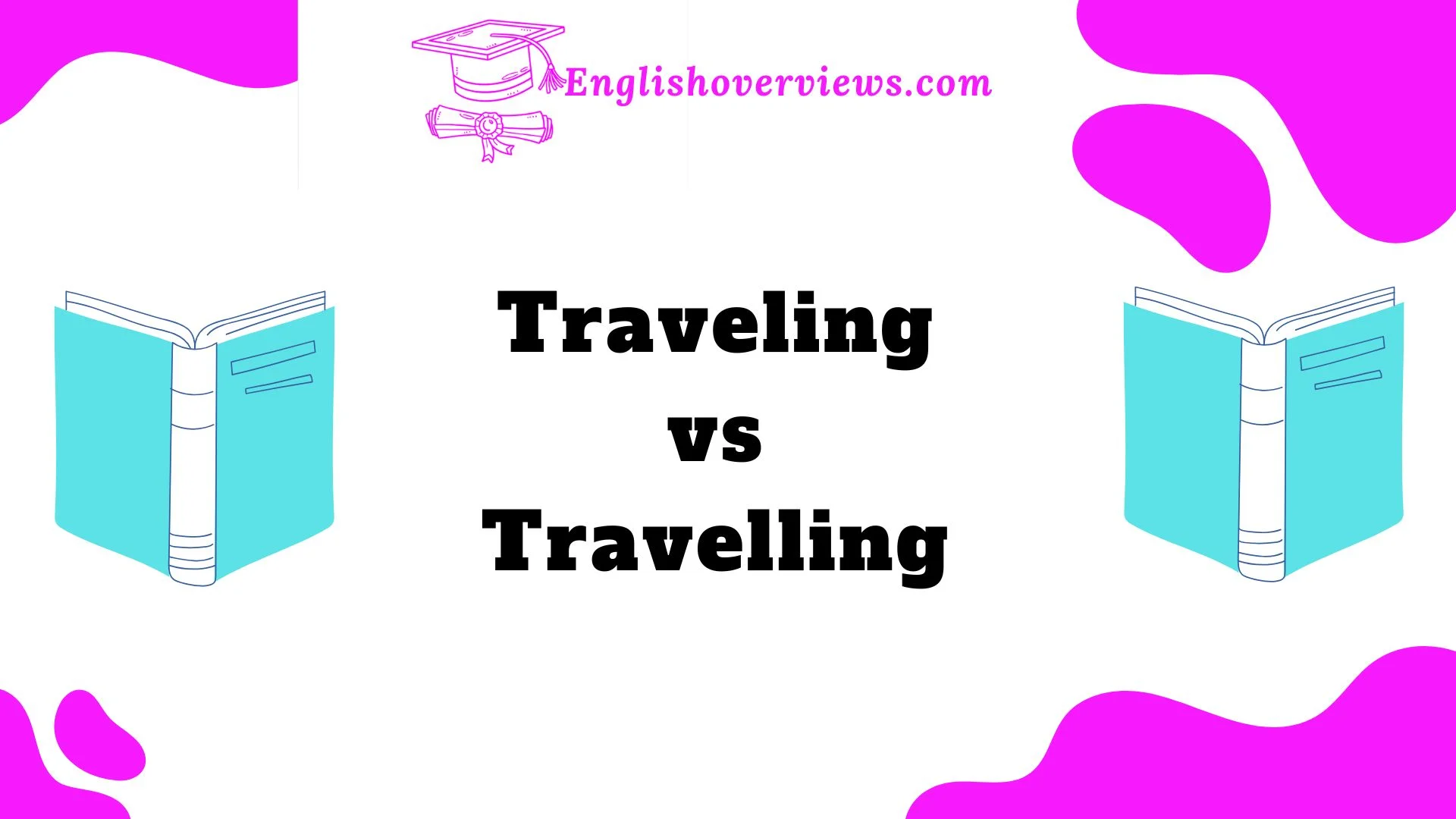When you sit down to write about your latest vacation or perhaps your next business trip, you may come across a spelling dilemma: should you use “traveling” vs “travelling”? While this may seem like a minor detail, the difference between the two spellings can be confusing, especially when you’re writing for a global audience.
Should you stick to American English or British English? The answer might depend on where you’re writing from and who you’re writing for. In this article, we’ll dive deep into the history, grammar rules, and usage of “traveling” vs “travelling” to help you make an informed decision.
So, which is correct? Let’s unpack this issue, examine the historical and grammatical background, and explore real-world examples. Whether you’re preparing an academic paper, crafting a novel, or simply writing a blog post, this guide will provide you with everything you need to confidently choose the right spelling for your context.
The American and British Spelling Dilemma
The debate over “traveling” vs “travelling” stems from broader differences in spelling between American English and British English. These differences arose over centuries of linguistic evolution, influenced by factors such as geography, culture, and historical events.
Key Spelling Differences Between American and British English
English is spoken all over the world, but each region has developed its own set of rules. When it comes to words like color vs. colour, theater vs. theatre, or realize vs. realise, spelling can often be an issue of regional preference.
For example:
- Color (American) vs. Colour (British)
- Defense (American) vs. Defence (British)
- Traveling (American) vs. Travelling (British)
This is not just about preferences; there are rules at play that stem from the ways each version of English evolved over time.
Why Do Americans Spell “Traveling” Without the Double L?
The simple answer is Noah Webster. In the early 19th century, Webster, an American lexicographer, sought to simplify English spelling. He believed that eliminating unnecessary letters would make the language easier to learn and use.
The Historical Influence of Noah Webster
Webster’s efforts to standardize American English included changing many traditional British spellings. For example, he advocated for “traveling” without the double L to match the more straightforward pattern found in many other American words.
- Webster’s Dictionary: Published in 1828, Webster’s dictionary became the standard reference for American English, promoting simpler spellings that would later become synonymous with American identity.
Webster believed that simplifying spelling made reading and writing more accessible, especially for learners of English. His changes became widely adopted in the United States and continue to define American English today.
British English and the Double “L”
In contrast, British English retained many of the traditional rules for spelling, which included doubling consonants in certain cases. This practice stems from the influence of Latin and French on the English language.
How the Double “L” Became Standard in British English
The double “L” in words like “travelling” and “cancelling” follows a longstanding pattern in English grammar. This rule is especially prevalent when the last syllable of the word is stressed.
In the case of “travel”, British English maintains the doubling of the L to reflect this pattern, and it’s consistent with words like “cancel” and “model”, where the consonant doubles in the presence of a stressed syllable.
The Grammar Behind “Traveling” and “Travelling”
Let’s break down the grammatical rules that govern the use of “traveling” vs. “travelling”.
Doubling the Final Consonant
In both American and British English, there are specific rules for when to double the final consonant of a word. The rule is relatively straightforward:
- If the word ends in a single consonant preceded by a single vowel, and the stress is on the final syllable, the final consonant is doubled in British English (e.g., “travel” becomes “travelling”).
- American English does not follow this rule for most words, including “traveling”. So, even though “travel” is stressed on the first syllable, Americans don’t double the final consonant.
Exceptions in American English
American English does have a few exceptions to the rule, especially when a consonant follows a diphthong (e.g., in words like “failing” or “baking”). In these cases, the “L” is not doubled in either version of English, highlighting an important distinction between American and British spelling norms.
When to Double the Final Consonant in American English
While British English regularly doubles the final consonant when forming the gerund or present participle (e.g., travelling), American English typically does not follow this pattern. American English prefers to simplify words, so in most cases, the final consonant remains a single letter.
Examples of American English Exceptions
- Canceled (not cancelled)
- Traveled (not travelled)
- Modeled (not modelled)
These are consistent with Webster’s principles of simplifying English spelling, and they are the preferred forms in the United States.
Multisyllabic Words: A Key Rule of Thumb
A helpful rule for identifying when to double the consonant is to look at the syllables in the word. In multisyllabic words, the final syllable must be stressed for the consonant to be doubled in British English.
- Example 1: “Travel” – British English uses the double L (“travelling”) because the stress is on the first syllable.
- Example 2: “Begin” – The final consonant doesn’t double because the stress is on the second syllable, even in British English.
Important Point: Words that don’t follow this rule in either version of English include those that end in “ing” or have diphthongs, where consonant doubling does not occur.
Geographical Spelling Preferences
The spelling “travelling” is more common in the UK and other countries that use British English, while “traveling” is favored in the United States. But what about the rest of the world? Here’s a quick guide:
- United States: Primarily uses “traveling”.
- United Kingdom: Primarily uses “travelling”.
- Canada: A mix of both; depends on context (e.g., “travelling” in British-influenced contexts).
- Australia: Similar to British English, prefers “travelling”.
Real-World Example: International Writing
Consider this real-world example: an American writer working for a global company might use “traveling” in their reports, but when writing for a British audience, they may adapt to the “travelling” spelling. The key is audience and context.
“Traveling” or “Travelling” in Professional Writing
In professional writing, it’s essential to be consistent in your use of either spelling. In international communications, the difference between “traveling” and “travelling” might not matter as much, but maintaining consistency is key.
- Tip: If you’re writing for a global audience, consider using tools like spell checkers or consulting style guides to ensure consistency.
The Importance of Consistency
For example, in a journal article, the author would not want to mix the two spellings. Consistent spelling creates a polished, professional image. Furthermore, academic papers typically follow the style guide of a particular university or publisher, which may dictate the spelling conventions.
Adapting Your Spelling to the Audience
Knowing your audience is crucial. For instance, if you’re writing for an American audience, use “traveling”. If you’re writing for a British audience, opt for “travelling”. Here’s how to adapt:
- Business Reports: Use “traveling” if your company is based in the US.
- Creative Writing: Choose the spelling that aligns with your target market.
- Travel Blogs: Adapt based on whether your readership is mostly American or British.
Common Usage in Journalism and Literature
Both spellings appear in journalism and literature, but the preference depends on the publisher’s style guide. For example:
- The New York Times (American publication) uses “traveling”.
- The Guardian (British publication) uses “travelling”.
Case Study: The Guardian vs. The New York Times
The spelling choice in these publications shows the consistency of regional differences and how they affect professional writing. As a writer, being aware of these standards ensures your work aligns with the expectations of your audience.
Conclusion: Navigating the Spelling Debate
Whether you write “traveling” or “travelling”, the key takeaway is that both are correct—but context matters. Understanding the history, grammar rules, and regional preferences will help you make the right choice for your audience. In professional writing, consistency is crucial, so pick one and stick to it. For the global traveler and writer, being adaptable is just as important as knowing which spelling to use.
FAQs
1. Why does American English not double the “L” in “traveling”?
American English simplified many traditional English spellings, including the decision to drop the double L in “traveling”. This change was popularized by Noah Webster.
2. Can I use “traveling” in British English?
While “travelling” is the preferred spelling in British English, using “traveling” is acceptable in some cases, especially for international readers.
3. Which spelling should I use in professional writing?
Stick to the regional convention of your audience. For American readers, use “traveling”; for British readers, use “travelling”.
4. Is there a universal spelling for both American and British English?
No, there isn’t. It’s important to adapt to the language rules and preferences of the audience you’re addressing.

English Overviews is a resourceful website dedicated to providing valuable content related to grammar and vocabulary.Babar Naeem has made notable contributions, sharing insights on various subjects, including WordPress themes and plugins. The primary goal of the site is to help users improve their English language skills effectively.











